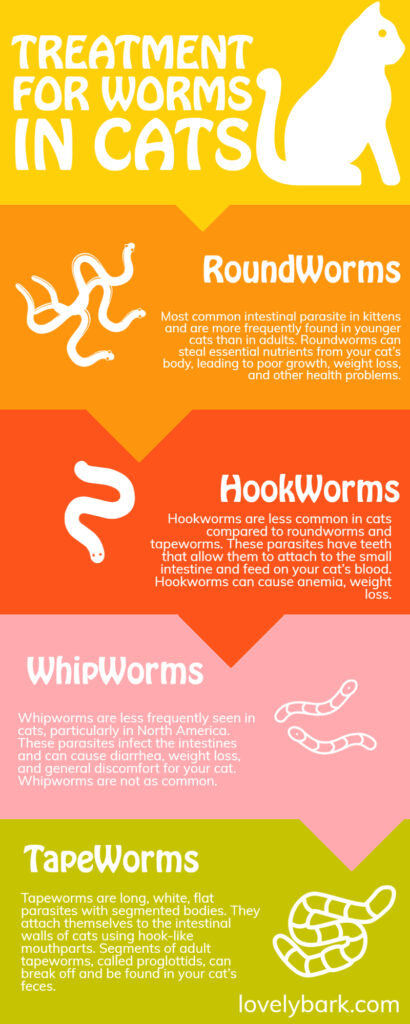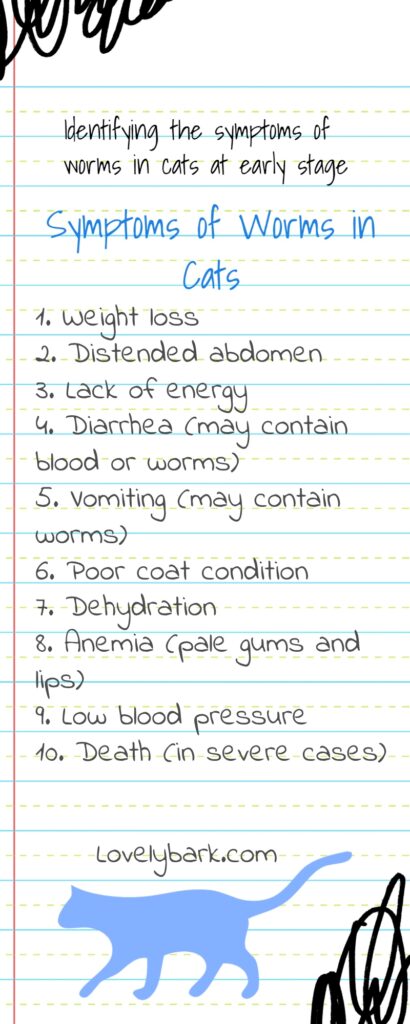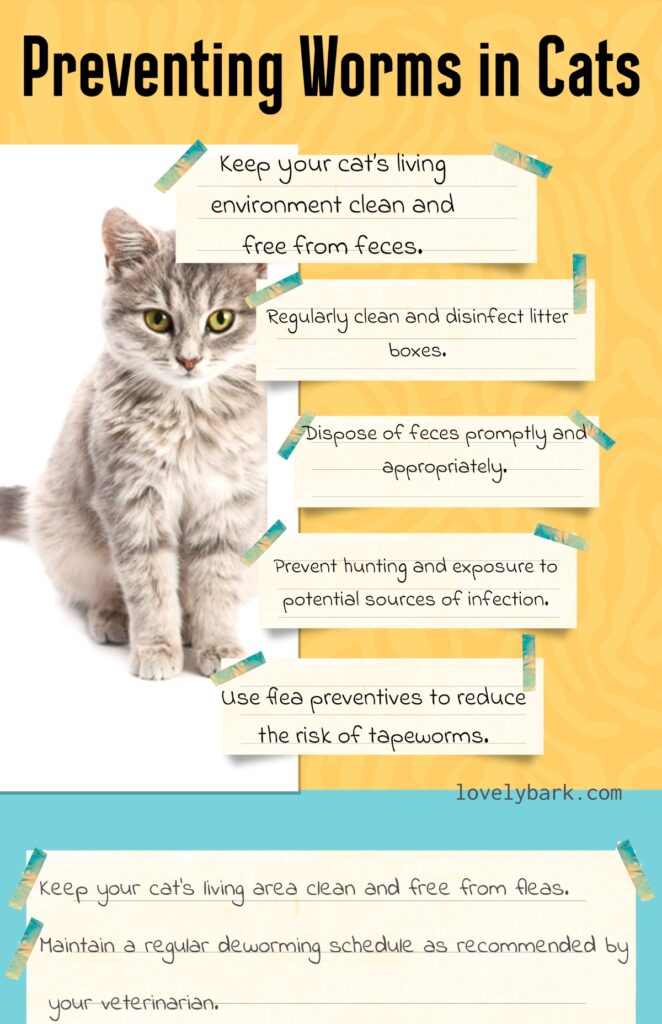Table of Contents

Types of Worms in Cats
There are several types of worms that can infect cats, each with its own unique characteristics. Understanding the different types of worms is essential for effective treatment and prevention. The most common worms found in cats include:Roundworms
Roundworms, also known as ascarids, are long, brown worms that resemble cooked spaghetti. They are the most common intestinal parasite in kittens and are more frequently found in younger cats than in adults. Roundworms can steal essential nutrients from your cat’s body, leading to poor growth, weight loss, and other health problems.Tapeworms
Tapeworms are long, white, flat parasites with segmented bodies. They attach themselves to the intestinal walls of cats using hook-like mouthparts. Segments of adult tapeworms, called proglottids, can break off and be found in your cat’s feces. These proglottids often resemble grains of rice and may be visible around your cat’s rear end. Tapeworms can be acquired through the ingestion of infected fleas or by consuming prey that is already infected.Hookworms
Hookworms are less common in cats compared to roundworms and tapeworms, but they can cause significant harm. These parasites have teeth that allow them to attach to the small intestine and feed on your cat’s blood. Hookworms can cause anemia, weight loss, and other serious health issues. Cats can acquire hookworms through contact with contaminated soil or through the ingestion of infected prey.Whipworms
Whipworms are less frequently seen in cats, particularly in North America. These parasites infect the intestines and can cause diarrhea, weight loss, and general discomfort for your cat. While whipworms are not as common, it is still important to be aware of their existence and take appropriate preventive measures.How Cats Get Worms
Cats can acquire worms through various means. The most common way cats become infected is by ingesting parasite eggs or coming into contact with infected feces. Cats are meticulous groomers, and while cleaning themselves, they may inadvertently ingest eggs or fecal particles that contain worm larvae. Cats can also get worms by sharing litter boxes with infected cats, hunting and consuming infected prey, or even by drinking their mother’s milk if she is infected. Additionally, cats that spend time outdoors are at a higher risk of contracting worms due to exposure to contaminated environments.Symptoms of Worms in Cats
Identifying the symptoms of worms in cats is crucial for early detection and treatment. However, it is important to note that some cats may show no symptoms at all, especially in the early stages of infection. Common signs of worms in cats include:- Weight loss
- Distended abdomen
- Lack of energy
- Diarrhea (may contain blood or worms)
- Vomiting (may contain worms)
- Poor coat condition
- Dehydration
- Anemia (pale gums and lips)
- Low blood pressure
- Death (in severe cases)
- If you notice any of these symptoms in your cat, it is essential to consult your veterinarian for a proper diagnosis and appropriate treatment.

Diagnosing Worms in Cats
To diagnose worms in cats, your veterinarian may conduct a physical examination and request a fecal examination. During the physical examination, the vet may check your cat’s abdomen for any signs of swelling or discomfort. A fecal examination involves analyzing a stool sample for the presence of worm eggs or segments. This helps determine the type of worms present and guides the selection of the most effective treatment.Treating Worms in Cats
When it comes to treating worms in cats, there are several options available. The choice of treatment will depend on the type of worms and the severity of the infestation. Treatment options for worms in cats include over-the-counter dewormers and prescription medications.Over-the-Counter Dewormers
Over-the-counter dewormers are readily available at pet stores and online. These products typically come in the form of oral medications or topical treatments. It is important to choose a dewormer specifically formulated for cats and to carefully follow the instructions provided. Over-the-counter dewormers are generally effective for mild to moderate infestations but may not be sufficient for more severe cases.Prescription Dewormers
For more severe worm infestations or specific types of worms, your veterinarian may prescribe prescription dewormers. These medications are stronger and typically require a prescription from a licensed veterinarian. Prescription dewormers are more targeted and effective at eliminating specific types of worms. Your vet will determine the most appropriate prescription dewormer based on the results of the fecal examination and your cat’s overall health. It is important to note that deworming medications may need to be administered multiple times to ensure all worms are eliminated and to prevent reinfestation. Your vet will provide specific instructions on dosage and administration.Preventing Worms in Cats
Prevention is key when it comes to protecting your cat from worms. Here are some measures you can take to prevent worms in cats:- Keep your cat’s living environment clean and free from feces.
- Regularly clean and disinfect litter boxes.
- Dispose of feces promptly and appropriately.
- Prevent hunting and exposure to potential sources of infection.
- Use flea preventives to reduce the risk of tapeworms.
- Keep your cat’s living area clean and free from fleas.
- Maintain a regular deworming schedule as recommended by your veterinarian.

Verdict
Worms in cats can be a distressing issue, but with prompt diagnosis and appropriate treatment, your cat can make a full recovery. Cat dewormers play a vital role in eliminating and preventing these parasites. Whether you opt for over-the-counter dewormers or prescription medications, it is essential to follow the instructions provided by your veterinarian. By taking preventive measures and maintaining a regular deworming schedule, you can help protect your beloved feline friend from the harmful effects of worms. Remember to consult your veterinarian for a tailored treatment plan and advice on the best deworming approach for your cat’s specific needs. With proper care and attention, you can keep your cat happy, healthy, and worm-free. In the below section we will dive a bit deeper into understanding the problem.Symptoms of Worms in Cats: How to Spot and Prevent Infestations
Intestinal worms are a common issue that can affect cats of all ages and breeds. These pesky parasites can cause discomfort and potentially serious health problems for your feline friend if left untreated. As a responsible pet owner, it’s important to be aware of the symptoms of worms in cats and take the necessary preventive measures to keep them healthy. In this comprehensive guide, we’ll discuss the various types of worms that can affect cats, their symptoms, and effective prevention strategies.Understanding Intestinal Worms in Cats
Intestinal worms are internal parasites that live in the digestive system of cats. The most common types of worms that can infect cats include roundworms, tapeworms, hookworms, and heartworms. Each of these worms poses different health risks and requires specific treatment approaches.Roundworms
Roundworms are the most common type of worms found in cats. These long, spaghetti-like worms reside in the intestines and can grow up to several inches in length. Kittens can contract roundworms from their mother’s milk, while adult cats can become infected through ingesting contaminated soil, water, or feces.Tapeworms
Tapeworms are segmented worms that can cause discomfort and digestive issues in cats. They are typically transmitted through the ingestion of fleas that carry tapeworm larvae. Cats that frequently groom themselves or have access to outdoor environments where fleas are present are at a higher risk of contracting tapeworms.Hookworms
Hookworms are small, blood-sucking worms that can cause anemia and other serious health problems in cats. These worms attach to the lining of the intestines and feed on the cat’s blood. Cats can contract hookworms through ingestion, skin contact, or even through their mother’s milk.Heartworms
Heartworms primarily affect dogs, but cats can also become infected. These worms are transmitted through mosquito bites and can migrate to the heart and lungs. Although heartworms are less common in cats, they can still cause severe health complications if not diagnosed and treated promptly.Recognizing the Symptoms of Worms in Cats
Identifying the symptoms of worm infestations is crucial for early detection and effective treatment. While some cats may not display any noticeable signs, others may exhibit the following symptoms:Digestive Issues
Worm infestations can lead to gastrointestinal problems, including diarrhea, vomiting, and changes in appetite. Cats with worms may experience weight loss, bloating, or a pot-bellied appearance. Keep a close eye on your cat’s litter box habits and observe any changes in their stool consistency.Lethargy and Weakness
Infected cats may appear lethargic, weak, or less active than usual. You may notice a decrease in your cat’s energy levels and playfulness. If your usually lively cat suddenly becomes sluggish, it could be a sign of a worm infestation.Poor Coat Condition
Worms can deprive your cat of essential nutrients, leading to a dull, lackluster coat. If your cat’s fur loses its shine, becomes dry or matted, it could indicate a worm problem. Additionally, skin irritations, such as lesions or excessive scratching, may also be present.Anemia
Hookworms, in particular, can cause anemia in cats due to their blood-feeding behavior. Anemic cats may exhibit pale gums, weakness, and fatigue. If you notice these symptoms, it’s important to seek veterinary attention promptly.Respiratory Issues
Cats infected with heartworms may show respiratory symptoms, such as coughing or difficulty breathing. While these symptoms are less common in cats, they should not be overlooked, as untreated heartworm infections can be life-threatening.Preventing Worm Infestations in Cats
Prevention is key when it comes to protecting your cat from worm infestations. By implementing the following preventive measures, you can significantly reduce the risk of your cat contracting intestinal worms:Regular Veterinary Check-ups
Regular visits to your veterinarian are essential for the overall health and well-being of your cat. During these check-ups, your vet can conduct fecal tests to detect the presence of worms and provide appropriate treatment if necessary. They can also recommend a suitable deworming schedule based on your cat’s lifestyle and risk factors.Deworming Medications
Administering regular deworming medications prescribed by your veterinarian is an effective preventive measure. These medications can help eliminate any existing worms and prevent future infestations. Different types of worms may require different medications, so it’s important to follow your vet’s instructions and use the appropriate products.Flea Control
Since fleas can transmit tapeworms to cats, it’s crucial to implement a comprehensive flea control program. Regularly use flea preventives recommended by your veterinarian, and ensure that your cat’s environment is free from fleas. Vacuuming and cleaning your home regularly can help eliminate fleas and prevent reinfestation.Hygiene Practices
Maintaining good hygiene practices can limit your cat’s exposure to worm eggs and larvae. Wash your hands thoroughly after handling your cat or cleaning their litter box. Keep your cat’s living area clean and dispose of their feces promptly to prevent contamination.Minimize Outdoor Exposure
Limiting your cat’s outdoor access can reduce their exposure to worms. Outdoor environments can harbor parasites and increase the risk of infection. If your cat does spend time outdoors, ensure they are supervised and avoid areas with known contamination, such as places frequented by stray cats or wildlife.Conclusion
Recognizing the symptoms of worms in cats and taking preventive measures are crucial for maintaining your cat’s health and well-being. Regular veterinary check-ups, deworming medications, flea control, hygiene practices, and minimizing outdoor exposure are key components of an effective preventive strategy. By staying vigilant and proactive, you can help ensure that your cat remains happy, healthy, and free from the discomfort of worm infestations. Remember, if you suspect that your cat may have worms or if you have any concerns about their health, consult your veterinarian for a thorough examination and appropriate treatment. With proper care and preventive measures, you can keep your furry companion safe from the harmful effects of intestinal worms.”FAQs”
How to get worms out of my cat ?
Most intestinal worms in cats are resolved with either a single dose of dewormer or a short course of deworming medication that your vet can prescribe and administer.
How to stop cat worms ?
Worms can be transmitted through food bowls, litter boxes, and water bowls. A cat infected with worms should have its own food bowl, water bowl, and litter box. Keep the infected cat in its own room in the house until a veterinarian confirms you have effectively treated the worms.
How much does it cost to treat worms in cats ?
Average cost of flea and worming treatment for your cat
Cats need monthly flea treatments which will set you back about £5 a month. Worming is another important preventative treatment needed every three months, which costs on average £15.
How to get rid cat worms ?
Keeping the living environment of the cat as clean as possible and removing their stool from the litter box promptly is important. Make sure your cat doesn't come in contact with other cats or dogs and use a dewormer regularly. You can also visit the vet if the problem persists.
How to treat worms for cats ?
The best way to treat worms in cats is with deworming medication, to kill both the larvae and adult worms within your cat's intestines. In many cases, dewormers may be given in multiple doses to interrupt the life cycle of the intestinal parasite.
What is the best treatment for worms in cats ?
They will usually prescribe a spot -on or oral dewormer which is given to the cat at the time of diagnosis to kill the worms, eggs and larvae right away. They might also recommend a monthly oral or topical treatment to stop them coming back.
What is the treatment for worms in cats ?
The best way to treat worms in cats is with deworming medication, to kill both the larvae and adult worms within your cat's intestines. In many cases, dewormers may be given in multiple doses to interrupt the life cycle of the intestinal parasite.
How to know if you have cat worms ?
For many cat owners, the first sign will be a visible presence of worms. You may see whole worms, parts of worms or worm eggs in your pet's stool or vomit. Worms or eggs can also sometimes migrate to a cat's anus, getting stuck in the fur.
How to check for parasites in cats ?
These parasites can be wormlike or one-celled protozoan organisms. They usually cause fairly nonspecific symptoms, such as a dull coat, coughing, vomiting, diarrhea, mucousy or bloody feces, loss of appetite, pale mucous membranes, or a potbellied appearance.


